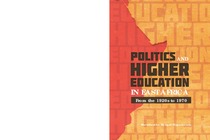| dc.contributor.author | Mngomezulu, Bhekithemba Richard | |
| dc.date.accessioned | 2022-02-04T08:00:12Z | |
| dc.date.available | 2022-02-04T08:00:12Z | |
| dc.date.issued | 2012 | |
| dc.identifier.citation | Mngomezulu, B.R. (2012). Politics and higher education in East Africa from the 1920s to 1970. Bloemfontein: Sun Media. https://doi.org/10.18820/9781920382247 | en_US |
| dc.identifier.isbn | 978-1-920382-24-7 | |
| dc.identifier.uri | https://doi.org/10.18820/9781920382247 | |
| dc.identifier.uri | http://hdl.handle.net/10566/7155 | |
| dc.description.abstract | The development of higher education in East Africa has a long history. For many years, the process was characterised by political wrangling, negotiations and compromises by black and white constituencies. What eventually became the federal University of East Africa (UEA) in 1963 was a saturation point of a process initiated by British authorities as part of the colonial thinking about imperial integration from the 1920s – an initiative that was later embraced by East Africans in the late1950s. During the inter-war period the British Colonial Office started formulating a standard policy on African education for its African territories. As part of this initiative, on 24 November 1923, the Duke of Devonshire, Secretary of State for the Colonies, appointed a Commission under the chairmanship of W.G.A. Ormsby-Gore, Under-Secretary of State for the Colonies, and tasked it to investigate and report on matters of Native Education in the British Colonies and Protectorates in Tropical Africa. The main goal was to advance the progress of education in those Colonies and Protectorates. The Commission concluded its work and submitted its Report to Devonshire early in 1925. The latter subsequently published the Report as Command Paper No. 2374 in March 1925. This marked the early stages of the process of developing higher education in East Africa.
One of the key recommendations of the Ormsby-Gore Commission was that the time was opportune for some public statement of principles and policy which would prove a useful guide to all those engaged, directly or indirectly, in the advancement of native education in the African continent. Thus, although the primary focus of the Ormsby-Gore Commission was not East Africa per se, this memorandum laid a solid foundation for the development of higher education in East Africa. | en_US |
| dc.language.iso | en | en_US |
| dc.publisher | Sun Media Bloemfontein | en_US |
| dc.subject | Higher education | en_US |
| dc.subject | Higher education institutions | en_US |
| dc.subject | East Africa | en_US |
| dc.subject | Universities | en_US |
| dc.subject | Politics | en_US |
| dc.subject | Parliamentary debates | en_US |
| dc.title | Politics and higher education in East Africa from the 1920s to 1970 | en_US |
| dc.type | Book | en_US |

